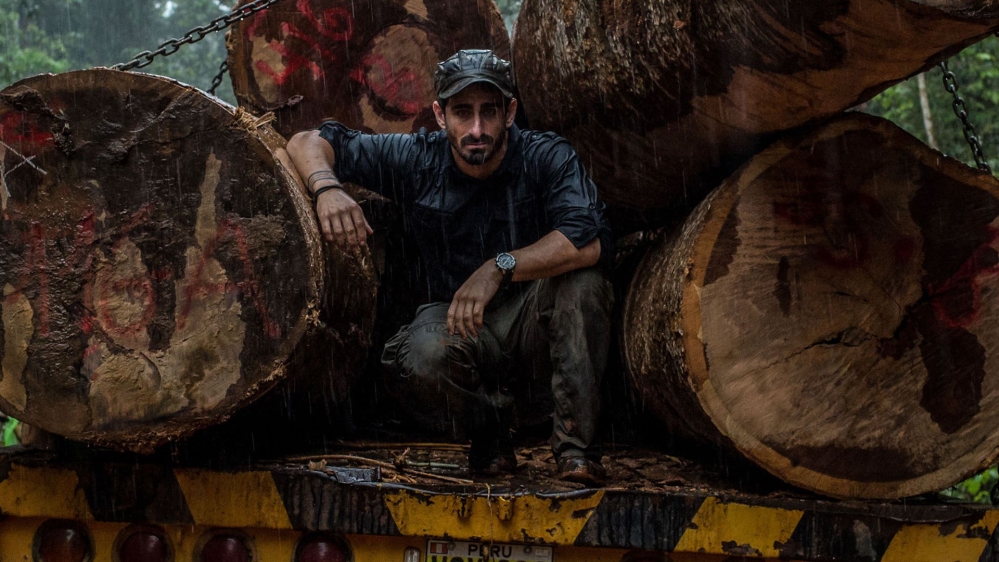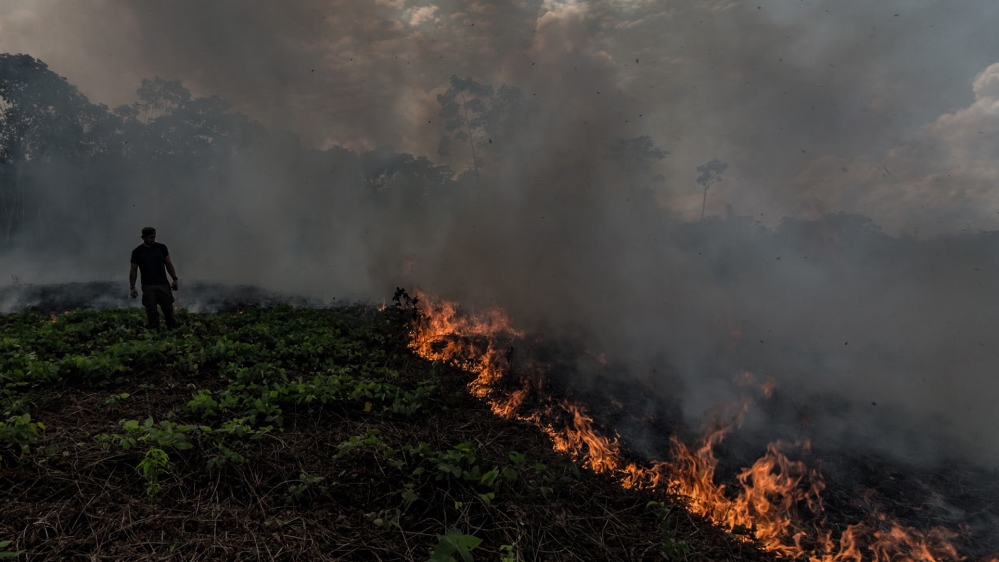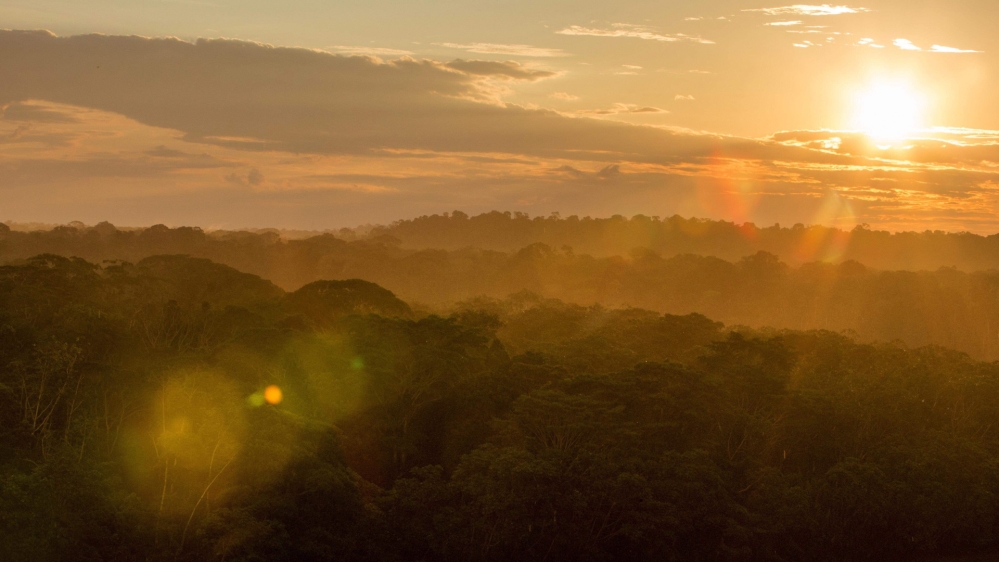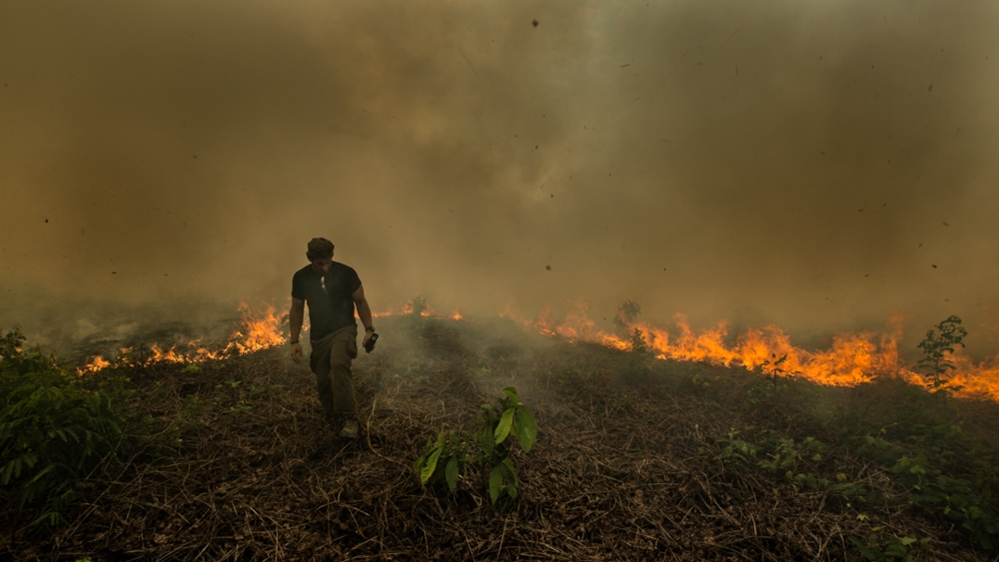Q&A: ‘We need radical change’ to protect the Amazon
Conservationist Paul Rosolie discusses the importance of the Amazon and how current generations can still save it.

In parts of the Amazon rainforest, as soon as one fire dies down out, another appears to break out.
The surge in the number of fires in the so-called “lungs of the planet” in July and August, prompted worldwide outcry, with many pointing to the controversial policies of Brazilian President Jair Bolsonaro, who has weakened environmental protections and pushed for the opening up of the rainforest to commercial farming and mining.
Keep reading
list of 4 itemsCould shipping containers be the answer to Ghana’s housing crisis?
Thousands protest against over-tourism in Spain’s Canary Islands
Holding Up the Sky: Saving the Indigenous Yanomami tribe in Brazil’s Amazon
Fires also raged in other parts of the Amazon region, including in Peru and Bolivia.
Although the number of fires has dropped in September and October, due in part to higher rainfall totals and a two-month ban on land clearing in Brazil, blazes still rage in some parts of the forest, which is home to about a million indigenous people and a diverse array of plants and wildlife animals.
Al Jazeera spoke to Paul Rosolie, author of, The Girl and the Tiger, conservationist, and director of the Peru-based JungleKeepers, in September about the importance of protecting the Amazon and its rich biodiversity.
Al Jazeera: The Brazilian fires have affected the Peruvian fires – can you update us on what’s happening on the ground?
Paul Rosolie: One of the really important things to understand about the Amazon is that political lines only mean something to us. The Amazon is a whole biome, so it’s happening across the whole place, so as the fires are raging in Brazil, they’re also raging in Peru and Bolivia and that’s affecting the entire basin. As we’re actually still getting into the height of the dry season, we’re actually going to see the fires continue to get worse and to continue to keep burning for at least another few months. And the thing is a few weeks ago, we had everybody get all excited about it, we had all this media attention – people posting about it on social media and now the news cycle has moved on and everybody’s forgotten about it but the fires are still going.

Al Jazeera: Why are there so many more fires now? Or is it that people are just waking up to what’s happening there?
Rosolie: That’s a great question because there’s a lot of people who are misunderstanding what’s actually going on. So, we actually, technically had higher levels of burning in the mid-2000s. The last few years, we’ve actually seen a decrease in burning in the Amazon each year. This year, because of President Bolsonaro’s removal of sanctions, he’s just allowing people to go in and burn where actually it is spiking sharply. Compared to what we’ve been seeing, this year is worse. Not the worst on record, but a very bad year. And the reason why this hit international attention this year is because the fires actually blew over Sao Paulo (Brazil) and the people in the city got to see a daytime eclipse from all of that smoke. That’s what made people put that on social media, it allowed the news to catch on that’s what shifted the global attention to the fires in the Amazon and made everybody get so excited about it.
The thing is, and its so important to remember, is that a) this happens every year and has been happening for decades b) there’s a lot of efforts and people saying, “Oh we should go put out the fires, we need to donate to organisations that’ll go put out the fires” – you can’t put out 70,000 fires across an area as big as the continental US. And these are not wildfires that were started by lighting, these are fires set by farmers clearing land for soy. These are intentional fires. So, the idea of going and sending firefighters is pretty ridiculous.
The thing that we really need is to be protecting this standing ancient rainforest that’s holding in all that carbon that protects all that biodiversity – the wildlife, the plants, animals and indigenous cultures that still live in these areas. That is what’s producing the rain that’s gonna keep the Amazon system healthy and that’s what’s going to keep the Amazon from burning. So, that’s protecting intact habitats and that’s the best way to stop fires. Everything else is just publicity and people’s sympathy sort of running wild, and that doesn’t actually make sense or help the problem.
Al Jazeera: Can the damage be reversed or repaired at some point? Is there a point of no return?
Rosolie: We have a saying in conservation that the victories are all temporary and it’s the losses that are final and every time you protect a forest, the government can change, the local politics change and then they could always come in and take away that national park sanctuary or those protections.
With ancient forests, you’re talking about thousands of year-old trees, you’re talking about complex ecosystems that can never be replicated, so no, actually, this cannot be fixed and that’s why it’s so crucial to protect the habitat that’s still standing because we are reaching – after 100 years of chipping away at the Amazon – especially in the last 30 years of development with the trans-Amazon highway and all these new roads, the Amazon is shrinking every year, we are reaching that point where we’re threatening the resilience of this system to provide for us.
And some of the things we get from the Amazon are precipitation, global climate regulation, the amount of carbon it stores, there’s just so many things that the Amazon provides, and if we test that too much, not only are we going to feel the global impacts of that, but we’re also, even for South American countries like Brazil, Peru, Venezuela, Colombia, Ecuador, Bolivia.
There’s all these countries, if their precipitation, if their rain patterns are threatened or reduced, irrigation for their crops will hit them economically and have really rapid impacts for their trade and their whole economy. So, this is really self-inflicted wounds in terms of life on Earth but also directly to leaders and policymakers and corporations – it’s gonna hurt them in the long run.
Al Jazeera: What are the indigenous people saying, their concerns?
Paul Rosolie: The organisation Amazon Watch recently shared a quote from a tribal leader and it said something to the effect of “we are terrified and soon you will be, too”. And it was saying like, they know what’s affecting them is soon going to affect the plant. And like you said, they are so much more connected to their land. People that don’t live tied to an ecosystem, or tied to a natural area – I mean you move houses, you move cities, you move across the world, you get a new job.
We don’t have that relationship with natural systems whereas these people, their sacred places – their temple, their church, their mosque – is the forest. Their medicines come from the forest, their food comes from – the monkeys, the trees, the rivers – so as these systems are depleted, we’re actually losing indigenous cultures, we’re losing entire languages as these people are pushed out of their lands and as their ability to make a living is destroyed.
If someone was to go into New York City and destroy a building, they'd be in jail for life. But we can go and destroy a river that sustains millions and millions of people ... and that's not considered a crime. So we need to update our software and how we think about these things because it's all wrong and remember that we are connected to the land.
And that’s really an important point too because the people that are burning the forest are Brazilians or Peruvians or whatever country you’re in across the Amazon – it’s not the indigenous people. That’s key to understand. So, for the most part, indigenous tribes are protecting their forest and it’s these outside, other citizens that are coming in, sort of invading indigenous these lands and burning them.
Al Jazeera: What do we need to do to repair the land and heal the people there?
Rosolie: There’s no question in my mind the last 13 years I’ve been in the Amazon, I’ve also worked in India and I’ve seen in the Amazon there’s really forest everywhere and humans exist in small islands. When I work in India, you see where humans are everywhere and forest is just these tiny islands. In India, you sort of see the ghost of climate change future where they’re having less rainfall, farmers are being impacted, rivers are polluted and it’s you see what happens. It takes away people’s ability to survive on the Earth. Our oceans are being destroyed. Without question, we are the most important generation in history because we’re the last generation that’s gonna have a chance to pull it back.
We need radical change in the next few years or else we’re going to cross that tipping point. With the Amazon, if you cut too much of it, and that moisture isn’t there, if the Amazon isn’t producing the clouds that rain back down on the Amazon, eventually that whole ecosystem could collapse and then you’d lose the Amazon and that would be catastrophic for life on Earth.

Al Jazeera: Are we almost at that tipping point?
Rosolie: We are almost at that tipping point. And its been very hard for me to watch every year the first burn because no one pays attention to it. And this is not an Amazonian issue. Don’t forget, we’re losing forest in Indonesia, we’re losing in New Guinea, we’re losing forest in the [Democratic Republic of the] Congo in Africa. It’s all over the world. If someone was to go into New York City and destroy a building, they’d be in jail for life. But we can go and destroy a river that sustains millions and millions of people, and a few guys get rich and everyone else is made poor – and that’s not considered a crime. So we need to update our software and how we think about these things because it’s all wrong and remember that we are connected to the land.
Another thing is we always talk about it in terms of politics, in terms of survival, in terms of culture, and different countries, we forget that we’re not the only animals on this planet. There are a lot of other animals and as these fires burn, I’ve been there in the burning fields, and I’ve seen animals burning, they have no where to go. And while humans are so concerned about human-things, we’ve lost 50 percent of the wildlife on our planet in the last 50 years. It’s devastating.
And for everyone that works in the field, we’re horrified. And for everyone that works in the city, I think they’re insulated. They see the news and man-made things all around them. But if you’re out there on the front lines, you’re terrified right now.
Al Jazeera: Is there part of the narrative that’s being missed by the media?
Rosolie: I see the media doing a good job saying, “This is important” but they also have a job to keep reporting news that sells. So they’re like, “The Amazon is burning” and everyone got really upset but what they’re missing is the urgency that this has to be systemic change. It has to be that we don’t elect leaders without good environmental policy, that we no longer allow corporations to get rich while millions of people that are tied to the land get more poor. We have this power. We have the ability to stop this.
That’s the crazy thing that, at the end of the day, not cutting down trees isn’t rocket science. We could fix this problem in Indonesia with the palm oil destroying these ancient rainforests and releasing so much carbon into the air. We could fix that problem overnight. You provide economic incentives to governments and to regional politicians to say, “We will help you if you stop this” and you also provide penalties. We have the influence, and we have the resources and we have the intelligence to do this and that’s why right now the climate movement and how many people are waking up.
And maybe even the positive thing that comes out of the Amazon fires this year is that people are shocked, people are scared and if we hold on to this moment – really, really use that to make serious change, then its possible we can pull it back. But I cannot emphasise that we are at that point.

Al Jazeera: Is there anything else that you’d like to add?
Rosolie: I really hope that people think about the fact that future generations will look back on us and say, “What were they thinking?” “What were they so worried about they let the world die?” It’s just so unacceptable and there seem to be people like, “What’s going on?” saying, “Oh, it seems really bad” and then they lose interest and they lose hope, and go, Oh well.”
At the end of the day, this is – and I’m an advocate for wildlife – but at the end of the day, this is people’s lives we’re talking about. The fishermen, the local people, and all of us. Everything we have comes from the earth, comes from ecosystems. This is the only place that we know of where there’s life for sure so we have a job to do and we have a lot of work to do and I think the more people talk about it, the more we take action and put pressure on leaders and to really understand the situation and get educated, this is the time to get some stuff done.
This interview has been edited for clarity and brevity.
